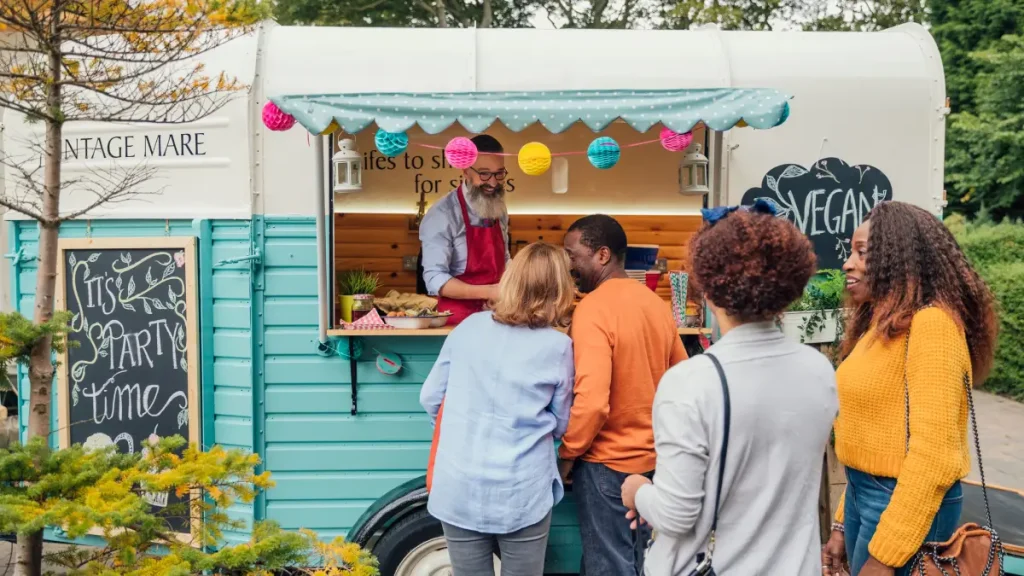
A Platter full of Sunshine: Your Guide to Starting a Food Truck Business in Florida
Florida’s vibrant culture, sunny weather, and constant influx of tourists make it a prime location for launching a successful food truck business. With its diverse population and a relaxed outdoor dining scene, the Sunshine State offers endless possibilities for mobile culinary entrepreneurs. But before you hit the road serving up delicious creations, there’s crucial groundwork to be laid. This guide will equip you with the knowledge and resources needed to begin the exciting journey of starting a food truck business in Florida.
Concept and Cuisine: Find Your Niche
- Market Research: Understanding your target audience is vital. Florida boasts a wide range of demographics, from health-conscious beachgoers to families seeking budget-friendly options. Conduct thorough market research to identify a gap in the local food scene. Is there a specific cuisine under-represented? Are there dietary restrictions your menu can cater to? Resources like the Florida Department of Economic Opportunity provide valuable demographic data to guide your research.
- Concept Development: Once you’ve identified a niche, hone your concept. Will you offer gourmet hot dogs with unique toppings, or perhaps authentic Latin American street food? Develop a clear and concise brand identity that resonates with your target audience.
- Menu Planning: Create a menu that’s both delicious and practical for a mobile kitchen. Focus on a limited selection of high-quality dishes that can be prepared and served efficiently. Consider portion sizes, pricing strategies, and potential menu items that travel well.
Business Legalities: Get Licensed and Permitted
Operating a food truck in Florida requires obtaining a variety of licenses and permits. Don’t get bogged down by the legalese – here’s a breakdown of the essentials:
- Business Structure: Choose a legal structure for your business, such as a sole proprietorship or LLC. The Florida Department of State website offers guidance on business registration.
- State Licenses: Obtain a Florida business license and a Mobile Food Establishment Permit from the Florida Department of Agriculture and Consumer Services (FDACS).
- Local Permits: Contact your city or county office to inquire about any additional local business licenses and permits required for mobile food vendors. This might include health permits, fire safety inspections, and vending permits for specific locations.
- Sales Tax Registration: Register with the Florida Department of Revenue to collect and remit sales tax on your food sales.
Funding Your Food Truck Dream
- Startup Costs: Be realistic about the financial investment required. Expenses include purchasing or leasing a food truck, outfitting it with commercial-grade kitchen equipment, obtaining licenses and permits, initial inventory, and marketing materials.
- Funding Options: Explore various avenues to secure funding for your food truck business. Consider personal savings, small business loans from banks or credit unions, crowdfunding platforms, or pitching your concept to angel investors. The U.S. Small Business Administration offers valuable resources and guidance for aspiring entrepreneurs.
Your Mobile Kitchen: Choosing the Right Food Truck
- New vs. Used: Decide whether to purchase a new or used food truck. New trucks offer a blank canvas for customization but come with a higher price tag. Used trucks can be a budget-friendly option, but be sure to factor in potential maintenance costs.
- Size and Functionality: Consider the size of your food truck in relation to your menu and desired equipment. Ensure it has ample space for food preparation, storage, and serving, while adhering to health and safety regulations.
- Customization Options: Explore customization options for your food truck, including signage, awnings, and interior layout to create a visually appealing and functional workspace.
Prime Locations: Hitting the Right Spots
- Identify Vending Zones: Research designated vending zones in your target areas. Popular locations for food trucks include office parks, beaches, public events, and areas with high foot traffic.
- Permits and Regulations: Not all locations are created equal. Understand any restrictions or permitting requirements associated with specific vending spots. Respect private property and obtain permission from property owners before setting up shop.
- Building Relationships: Cultivate relationships with local businesses to explore potential partnerships or shared vending opportunities.
Legal Formalities: Permits and Licenses for Your Florida Food Truck
The sunshine and vibrant food scene might be the initial draw for your Florida food truck business, but before you dish out delicious fare, ensure you’ve navigated the legal requirements. Here’s a detailed breakdown of the permits and licenses you’ll need to secure:
State-level Essentials
- Florida Business License: Register your business with the Florida Department of State start business. This establishes your legal existence and allows you to operate as a business entity.
- Mobile Food Establishment Permit: Issued by the Florida Department of Agriculture and Consumer Services FDACS, this permit authorizes you to operate a mobile food service business in the state. The FDACS website provides detailed information on the application process and required documentation.
Don’t Forget the Locals: City and County Permits
While the state-level permits provide a foundation, most Florida cities and counties have additional regulations for mobile food vendors. Contact your local government office (city or county) to inquire about:
- Local Business License: Many localities require a separate business license specifically for mobile food vendors.
- Health Permit: Local health departments typically issue health permits after inspecting your food truck to ensure compliance with health and safety regulations.
- Fire Safety Inspection: Your local fire department might require an inspection of your food truck to verify compliance with fire safety codes.
- Vending Permits: Certain locations, like parks or specific streets, might have designated vending zones that require specific permits. Research and obtain any necessary vending permits for your target locations.
Additional Considerations
- Certified Food Protection Manager (CFPM): At least one person involved in your food truck operation needs to be a Certified Food Protection Manager (CFPM). This individual demonstrates the knowledge and skills necessary to handle food safely and prevent foodborne illnesses. The FDACS website offers information on obtaining CFPM certification.
- Commissary Agreement: If you plan to prepare food off-site (not within your food truck), you’ll need a commissary agreement with a licensed commercial kitchen facility. This agreement allows you to utilize the commissary for food preparation, storage, and cleaning in accordance with health regulations.
- Sales Tax Registration: Register with the Florida Department of Revenue to collect and remit sales tax on your food sales.
By obtaining the necessary permits and licenses, demonstrating food safety knowledge, and adhering to local regulations, you’ll ensure a smooth launch for your Florida food truck business. Remember, this information provides a general overview, and it’s crucial to stay updated on any changes or specific requirements in your city or county. Don’t hesitate to contact your local government agencies and the FDACS for the most recent information and guidance.
Table of Contents



1 comment
[…] Food truck business is sure to bring a lot of profit. And when it’s launched in a lively metropolitan state such as Florida, chances of winnings are high. […]